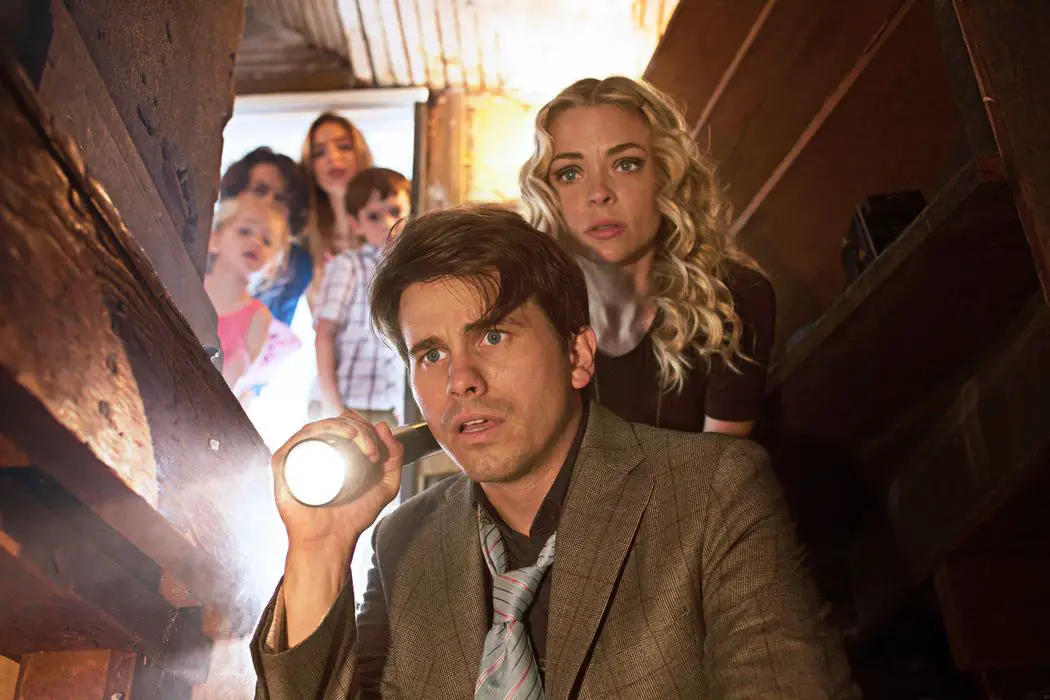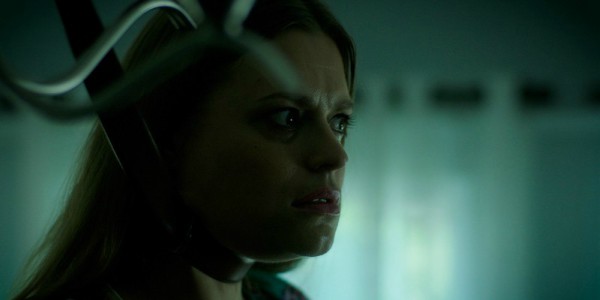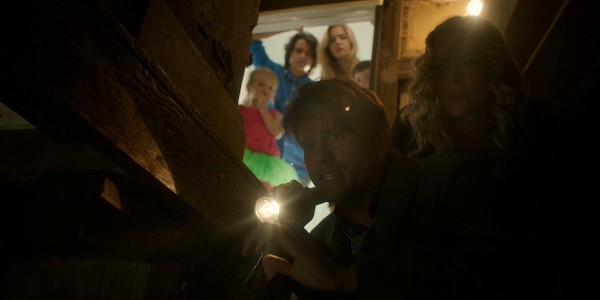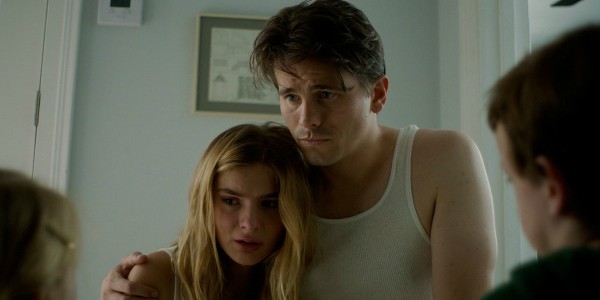BITCH: Bold, Hopeful & Fiercely Entertaining

It took me a while to discover the wonderful world…
Between the unabashed sexist occupying the White House, and recent revelations about the staggering amount of sexual predators who have been groping their way across Hollywood, the last two years have not been kind to women. With more stories coming out by the day detailing the awfulness of men in various positions of power, it would be so easy to give in to despair.
What an apposite time then, for Marianna Palka‘s Bitch to be released. Whilst it doesn’t deal directly with sexual abuse, it confronts this toxic power imbalance between men and women head-on. It presents us with an arrogant, powerful man, hurls him into the chaos that he himself created, and allows him to grow from the experience. It’s a plea for empathy, and a paean to the importance of listening.
Bitch may not have the power to single-handedly solve the pervasive problems that affect every area of our society, but it gives us ideas about where to start. And there’s a lot of fun to be had along the way.
Bitch
Jill Hart (Marianna Palka) has reached her limit. Getting no help in raising her four unruly children from her philandering husband Bill (Jason Ritter), she suffers a psychological break. She adopts the personality of a rabid dog; no longer speaking but snarling, and using anywhere as a toilet except the actual toilet.
Suddenly thrust into the role of single father, Bill has no idea what to do. He isn’t sure where his kids go to school, he doesn’t know what to feed them, and he has no clue what to do about his wife, prowling in the basement on all fours, covered in her own feces and growling at herself. His high-powered job is in peril as he flails around, desperately trying to pretend there is nothing wrong.

Though Jill’s sister Beth (Jaime King) tries to help, it’s clear that only through growing up and changing his neglectful ways will Bill get his wife back. It isn’t going to be easy, but there’s no other choice if he is to help his family recover from this most peculiar incident.
Unsubtle
Actor/Writer/Director Marianna Palka is in no way coy about the message of her movie. She knows exactly what she wants to say, and she says it loudly.
Before making the change into a dog, we see Jill’s unsuccessful suicide attempt. It is after that that she tells her uninterested husband, “I’m terrified I’m going to do something.” That Bill is so surprised when she actually does do something is an indictment of his neglect and dangerous attachment to gender roles. As far as he is concerned, he brings in the money, and she looks after the kids. He doesn’t see why he should help her. In the early stages of Jill’s ‘doggishness’, he still considers himself the victim, referring to what is obviously severe psychiatric trauma as her ‘taking a break’.
Bitch is far from the first movie to tackle these issues. There are legions of other films, dating from the beginning of cinema, that deal with absent husbands and desperate wives. It’s not the subject but the way that Palka choses to approach it that makes the movie so interesting.
It starts from the title, a double entendre; bitch as female dog, and bitch as female put-down. An early sequence ends with Bill, finally back in his car after a hectic morning, screaming epithets about his wife whilst forgetting he still has one child left in the back seat. Jill is called a bitch, and quite literally becomes one. It’s symbolism at its most basic, and the simplicity is what makes it so potent.

And everything else in the movie follows suit. Nothing is delicate, nothing is subtle. The soundtrack is jazz at its most noisy and atonal – notes clattering around from an array of instruments, not seeming to follow any order or rhythm. Bill is cartoonishly awful (or at least starts off that way), and the children almost feral. If something can be dialed up to eleven, then it absolutely will be. The chaos is wildly entertaining and often hilarious; the resolute lack of restraint is invigorating.
What is even more impressive are the layers that Palka finds within the loudness. Whilst this film has an angriness to it, it is not an angry film, in fact by the end it has become actively hopeful. Jason Ritter‘s character starts off seeming like a cartoon, but he doesn’t remain like one. Palka‘s film may be noisy, but it certainly doesn’t lack for nuance.
Bill, Jason Ritter & Hopefulness
Beyond her writing and directing, Palka does an excellent job acting in a very unusual role. Though for most of the movie she is wordless, she expresses boundless emotion behind her growls and snarls. It would have been an easy part to turn into a joke, but you always feel for Jill; she always seems human even when she isn’t acting like one.
For most of the movie however, she is out of sight, in the basement. As an audience we spend a lot more time with Jason Ritter‘s character, and it’s a real reminder of what an excellent, under-appreciated actor he is.
When we first meet Bill, he is farcically awful. He declines the opportunity to save the jobs of a whole floor of his colleagues (including his mistress), by resigning from his own. He ignores his wife’s obvious pleas for help. He doesn’t know anything about his children. In the first act of this film, every line he says seems more awful than the last.

It’s a credit to Ritter that whilst he’s in this villainous phase, he always remains sympathetic. The character of Bill begins in such a dreadful place, it’s hard to imagine many actors pulling off the trick of keeping the audience on side. Ritter is so likable though, he manages; you even feel a little sorry for Bill as he flounders around, struggling to do the things his wife has done every day without complaint.
This sympathy that you feel for Ritter at his worst makes his redemptive arc all the more rewarding. Palka could have turned this into a hopeless film, a tale of wronged women and useless men, without the hope of a happy ending. Bill’s arc however, is an optimistic one, centering on the importance of empathy. It is only when Bill is plunged into the chaotic world of his wife that he understands what she has been going through. Though she can no longer speak, circumstances force him to listen. And once he begins to listen, the swirl of chaos that has blighted him starts to recede. That’s the hopeful core that makes Bitch an important film for this moment in time.
In Conclusion
It’s likely that many people will be turned off Bitch, thanks to its relentless mayhem, defiant message, and general noisiness.
Well, it’s their loss. Marianna Palka‘s movie is an energizing study of a deep-rooted societal problem told with boldness and a healthy scoop of humor. The redemptive arc of Jason Ritter‘s character, made even better by his winning performance, offers us a believable hope during these bleak days for gender relations.
It’s a wonderful film; humanely acted, fiercely entertaining and commendably nuanced. It deserves a wide audience. The world would be better for it.
Have you seen Bitch? What did you think?
Bitch was released in the US on November 10th. For further release information, click here.
Does content like this matter to you?
Become a Member and support film journalism. Unlock access to all of Film Inquiry`s great articles. Join a community of like-minded readers who are passionate about cinema - get access to our private members Network, give back to independent filmmakers, and more.
It took me a while to discover the wonderful world of cinema, but once I did, everything just fell into place.













